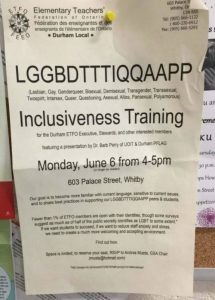Also:
Author Archives: Stephen Henry Miller
Not Just Off the Shelf
The Wall Street Journal opines:
At issue is whether baker Jack Phillips, who opposes same-sex marriage out of sincere religious beliefs, can be compelled to custom design a cake for a gay nuptial. …
While some on the left liken Mr. Phillips to hotel owners in the Jim Crow era, there’s no evidence of invidious discrimination. Mr. Phillips and others who have denied wedding services to same-sex nuptials have consistently served gays in other contexts. Mr. Phillips said he would sell the gay couple other baked goods—simply not a custom wedding cake.
As the editorial notes, the issue pits the government’s interest in social equality against an individual’s constitutional right to express his beliefs.
22 Comments
Jim Nabors, RIP
Interesting that the Fox News story leads with “husband,” with relationship details below after professional info. The Hollywood Reporter mentions his “longtime partner” up front, but toward the end says that they’d been married.
6 Comments
Not a Parody
(image via Reddit)
As advertised by the Elementary Teachers’ Federation of Ontario, but perhaps soon to make its way down to the states.
That’s lesbian, gay, genderqueer, bisexual, demisexual, transgender, transsexual, two-spirit, intersex, queer, questioning, asexual, allies, pansexual, polygamous.
The flyer says: “Our goal is to become more familiar with current language, sensitive to current issues, and to share best practices in supporting our LGGBDTTTIQQAAPP peers & students.”
That’s a lot to cover in one hour!
More. Andrew Sullivan blogs on LGGBDTTTIQQAAPPWHAT? and asks, “Is the gay-rights movement effectively over?” (second item):
For most of the straight people we need to engage, it feels like a near-parodic example of hair-splitting victimology and grievance-mongering. And to me, and many who once thought of ourselves as supporters of gay equality, it feels like an unpronounceable and impenetrable congeries of literally everything … and therefore nothing.
He adds:
My point is that a political movement makes sense in a liberal society because it advances certain policy proposals, and not because it spends its time constantly defining and redefining who is or who is not part of it, or sees itself as just one sliver of a broader movement dedicated to an ideology a very hefty chunk of the gay world simply doesn’t adhere to or believe in.
3 Comments
Anything Goes
13 Comments
Too ‘Gay’?
The Facebook embed cuts off the full comment, but what the Mattachine Society of Washington, D.C., posted was:
We confirmed today the Washington film festival “Reel Affirmations” actually rejected “The Lavender Scare” for screening this fall. What film was their “Centerpiece” selection? “Apricot Groves”, an Armenian/American trans drama/romance–“Aram returns to Armenia to propose to his girlfriend….” ! After more than 50 screenings nationwide, from Tampa to Fresno, with TEN “Best of Festival” awards, and a major focus on Frank Kameny’s advocacy, “The Lavender Scare” has yet to be screened in Washington, DC.
Today’s dominant view:
11 Comments
Not about “serving” at all, it seems
From Money magazine: Transgender surgery can cost more than $100,000.
2 Comments
Oh what a tangled web we weave…
More here:
And perhaps more to the point:
And:
4 Comments
Diversity and Heresy
Denise Young Smith, Apple’s first vice president of inclusion and diversity, is resigning from her position after less than a year. Smith’s announcement follows the response to comments she made during a panel discussion in October. As reported by Quartz:
When asked whether she would be focusing on any group of people, such as black women, in her efforts to create a more inclusive and diverse Apple, Young Smith says, “I focus on everyone.” She added: “Diversity is the human experience. I get a little bit frustrated when diversity or the term diversity is tagged to the people of color, or the women, or the LGBT.”
Young Smith went on to add that “there can be 12 white, blue-eyed, blonde men in a room and they’re going to be diverse too because they’re going to bring a different life experience and life perspective to the conversation.”
For the heresy of viewing life experience as being as central to a diverse workforce as is race, sexual orientation or gender identity, Young Smith (at the very least) felt pressured to resign.
And Democrats wonder how it could be that so much of the white working class has abandoned the party of progressivism.
More.
.@Apple fires Diversity Chief for suggesting that intellectual diversity is important too.
Wrongthink has no place in Silicon Valley.https://t.co/ea0TAF1rK5
— Jon Stewart Mill (@RoundSqrCupola) November 17, 2017
3 Comments
Accusers and Deniers
